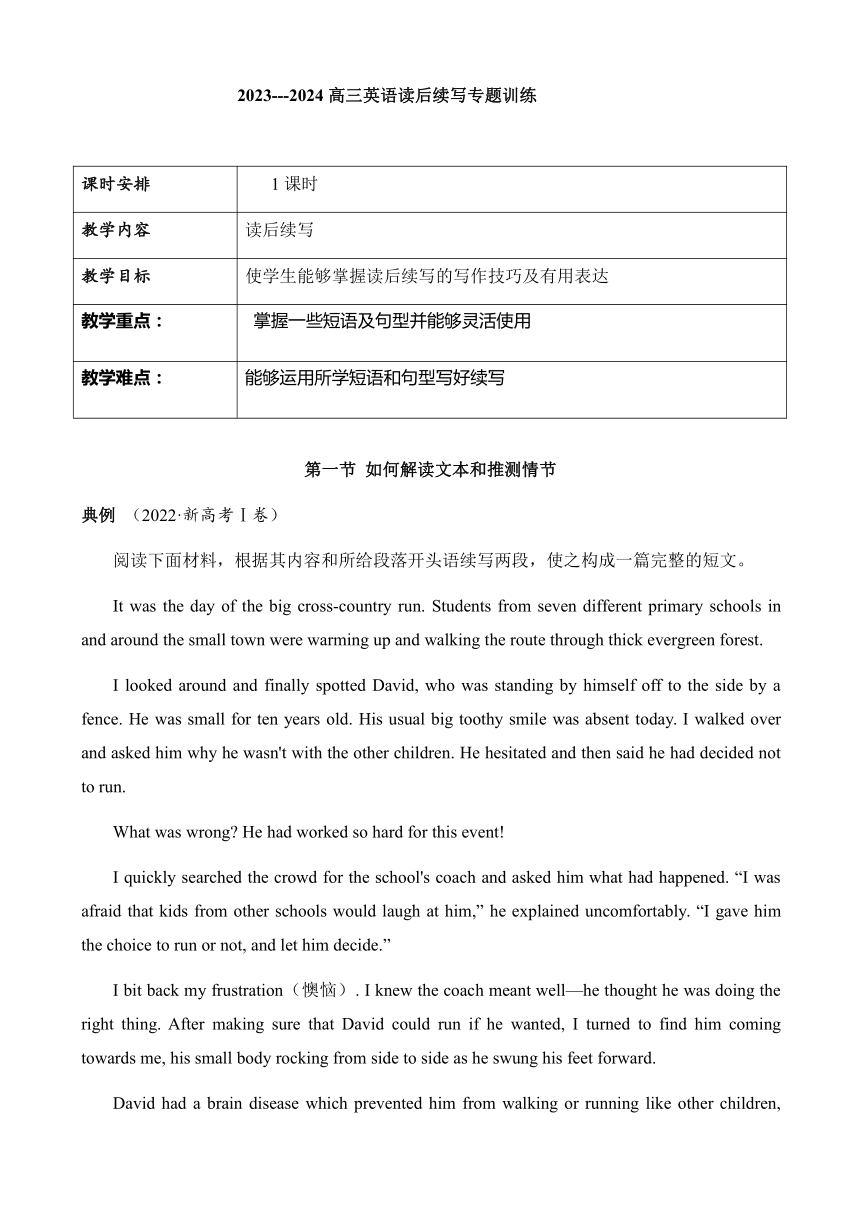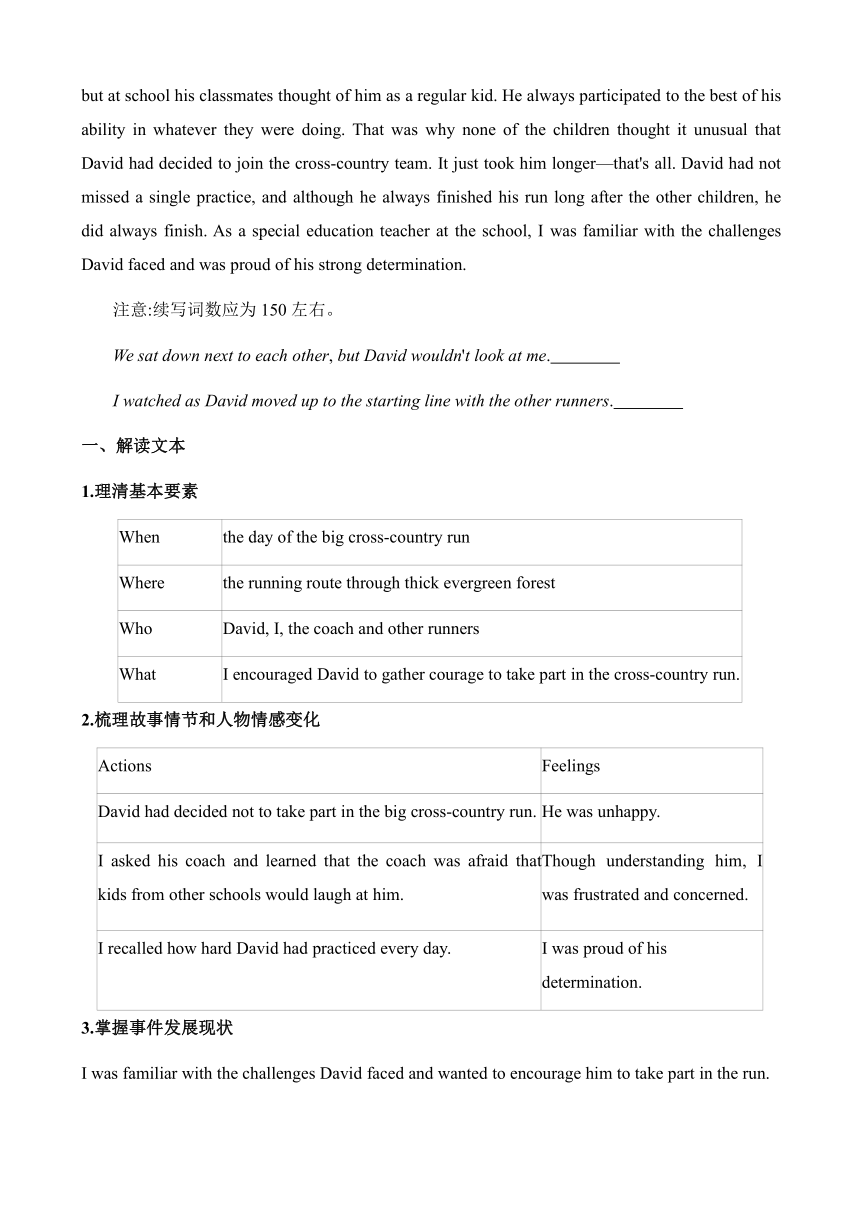2024届高三下学期英语作文复习专项读后续写-如何解读文本和推测情节 讲义
文档属性
| 名称 | 2024届高三下学期英语作文复习专项读后续写-如何解读文本和推测情节 讲义 |

|
|
| 格式 | docx | ||
| 文件大小 | 16.7KB | ||
| 资源类型 | 教案 | ||
| 版本资源 | 通用版 | ||
| 科目 | 英语 | ||
| 更新时间 | 2024-05-20 15:08:04 | ||
图片预览


文档简介
2023---2024高三英语读后续写专题训练
课时安排 1课时
教学内容 读后续写
教学目标 使学生能够掌握读后续写的写作技巧及有用表达
教学重点: 掌握一些短语及句型并能够灵活使用
教学难点: 能够运用所学短语和句型写好续写
第一节 如何解读文本和推测情节
典例 (2022·新高考Ⅰ卷)
阅读下面材料,根据其内容和所给段落开头语续写两段,使之构成一篇完整的短文。
It was the day of the big cross-country run. Students from seven different primary schools in and around the small town were warming up and walking the route through thick evergreen forest.
I looked around and finally spotted David, who was standing by himself off to the side by a fence. He was small for ten years old. His usual big toothy smile was absent today. I walked over and asked him why he wasn't with the other children. He hesitated and then said he had decided not to run.
What was wrong He had worked so hard for this event!
I quickly searched the crowd for the school's coach and asked him what had happened. “I was afraid that kids from other schools would laugh at him,” he explained uncomfortably. “I gave him the choice to run or not, and let him decide.”
I bit back my frustration(懊恼). I knew the coach meant well—he thought he was doing the right thing. After making sure that David could run if he wanted, I turned to find him coming towards me, his small body rocking from side to side as he swung his feet forward.
David had a brain disease which prevented him from walking or running like other children, but at school his classmates thought of him as a regular kid. He always participated to the best of his ability in whatever they were doing. That was why none of the children thought it unusual that David had decided to join the cross-country team. It just took him longer—that's all. David had not missed a single practice, and although he always finished his run long after the other children, he did always finish. As a special education teacher at the school, I was familiar with the challenges David faced and was proud of his strong determination.
注意:续写词数应为150左右。
We sat down next to each other, but David wouldn't look at me.
I watched as David moved up to the starting line with the other runners.
一、解读文本
1.理清基本要素
When the day of the big cross-country run
Where the running route through thick evergreen forest
Who David, I, the coach and other runners
What I encouraged David to gather courage to take part in the cross-country run.
2.梳理故事情节和人物情感变化
Actions Feelings
David had decided not to take part in the big cross-country run. He was unhappy.
I asked his coach and learned that the coach was afraid that kids from other schools would laugh at him. Though understanding him, I was frustrated and concerned.
I recalled how hard David had practiced every day. I was proud of his determination.
3.掌握事件发展现状
I was familiar with the challenges David faced and wanted to encourage him to take part in the run.
二、推测情节
1.推测第一段内容
①What would I say to persuade David
“You are a determined boy and I believe you can face the challenge bravely.”
②How would David react to my persuasion
He was inspired.
③What would be David's decision at last
He decided to take up the challenge and take part in the run.
2.推测第二段内容
①What would David's performance be like
David fell behind though he tried his best.
②What would I do then
I shouted crazily to cheer him up.
③What would David get from the run
He received lots of applause and owned a heart to overcome difficulties.
范文展示:
We sat down next to each other, but David wouldn't look at me. “Why do you give up the run, David ” I whispered to him. “I will be a loser and others will laugh at me,” he murmured, with his face flushing. I hugged him tightly, saying, “You are a determined boy and I believe you can face the challenge bravely. More importantly, it is participation rather than the result that matters to you.” Inspired by what I said, David looked up and said firmly, “I will run.” Rising and turning around, he headed for the starting line.
I watched as David moved up to the starting line with the other runners. Hearing the gun blasting, they rushed out like arrows. However, David fell behind soon despite great efforts. Every time he was about to quit, I shouted crazily, “Come on, David!” He kept running, sweaty and exhausted. Finally, when David struggled to cross the finishing line, a storm of cheers and applause erupted from the people present. Dragging his heavy legs, David approached me. He embraced me and said, “Thank you!” I was overwhelmed with joy for his wonderful performance.
课时安排 1课时
教学内容 读后续写
教学目标 使学生能够掌握读后续写的写作技巧及有用表达
教学重点: 掌握一些短语及句型并能够灵活使用
教学难点: 能够运用所学短语和句型写好续写
第一节 如何解读文本和推测情节
典例 (2022·新高考Ⅰ卷)
阅读下面材料,根据其内容和所给段落开头语续写两段,使之构成一篇完整的短文。
It was the day of the big cross-country run. Students from seven different primary schools in and around the small town were warming up and walking the route through thick evergreen forest.
I looked around and finally spotted David, who was standing by himself off to the side by a fence. He was small for ten years old. His usual big toothy smile was absent today. I walked over and asked him why he wasn't with the other children. He hesitated and then said he had decided not to run.
What was wrong He had worked so hard for this event!
I quickly searched the crowd for the school's coach and asked him what had happened. “I was afraid that kids from other schools would laugh at him,” he explained uncomfortably. “I gave him the choice to run or not, and let him decide.”
I bit back my frustration(懊恼). I knew the coach meant well—he thought he was doing the right thing. After making sure that David could run if he wanted, I turned to find him coming towards me, his small body rocking from side to side as he swung his feet forward.
David had a brain disease which prevented him from walking or running like other children, but at school his classmates thought of him as a regular kid. He always participated to the best of his ability in whatever they were doing. That was why none of the children thought it unusual that David had decided to join the cross-country team. It just took him longer—that's all. David had not missed a single practice, and although he always finished his run long after the other children, he did always finish. As a special education teacher at the school, I was familiar with the challenges David faced and was proud of his strong determination.
注意:续写词数应为150左右。
We sat down next to each other, but David wouldn't look at me.
I watched as David moved up to the starting line with the other runners.
一、解读文本
1.理清基本要素
When the day of the big cross-country run
Where the running route through thick evergreen forest
Who David, I, the coach and other runners
What I encouraged David to gather courage to take part in the cross-country run.
2.梳理故事情节和人物情感变化
Actions Feelings
David had decided not to take part in the big cross-country run. He was unhappy.
I asked his coach and learned that the coach was afraid that kids from other schools would laugh at him. Though understanding him, I was frustrated and concerned.
I recalled how hard David had practiced every day. I was proud of his determination.
3.掌握事件发展现状
I was familiar with the challenges David faced and wanted to encourage him to take part in the run.
二、推测情节
1.推测第一段内容
①What would I say to persuade David
“You are a determined boy and I believe you can face the challenge bravely.”
②How would David react to my persuasion
He was inspired.
③What would be David's decision at last
He decided to take up the challenge and take part in the run.
2.推测第二段内容
①What would David's performance be like
David fell behind though he tried his best.
②What would I do then
I shouted crazily to cheer him up.
③What would David get from the run
He received lots of applause and owned a heart to overcome difficulties.
范文展示:
We sat down next to each other, but David wouldn't look at me. “Why do you give up the run, David ” I whispered to him. “I will be a loser and others will laugh at me,” he murmured, with his face flushing. I hugged him tightly, saying, “You are a determined boy and I believe you can face the challenge bravely. More importantly, it is participation rather than the result that matters to you.” Inspired by what I said, David looked up and said firmly, “I will run.” Rising and turning around, he headed for the starting line.
I watched as David moved up to the starting line with the other runners. Hearing the gun blasting, they rushed out like arrows. However, David fell behind soon despite great efforts. Every time he was about to quit, I shouted crazily, “Come on, David!” He kept running, sweaty and exhausted. Finally, when David struggled to cross the finishing line, a storm of cheers and applause erupted from the people present. Dragging his heavy legs, David approached me. He embraced me and said, “Thank you!” I was overwhelmed with joy for his wonderful performance.
